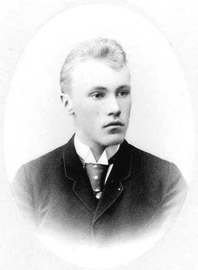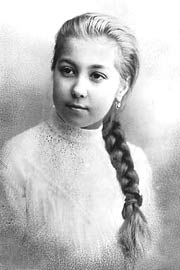ADOLESCENCE
|
The time of childhood passed, then came the anxious time of adolescence. Nicholas Roerich studied in the gymnasia (in pre-Revolutionary Russia, the secondary school of the highest grade, a preparatory school for universities). At the age of seventeen, he started systematically to devote himself to painting, under the guidance of the famous Russian painter Mikeshin, who was the first to note the youth’s talent.
In 1893 Nicholas graduated from the gymnasia and began to think about entering the Academy of Arts, and also to take classes in the History Department at the University. However, his father didn’t consider painting to be a fit vocation for his son, and he wanted Nicholas to become a lawyer.
Nicholas enrolled simultaneously in the Academy of Arts and in the Law Department (at the sacrifice of the History Department) at St. Petersburg University. Even so, he continued to affirm before his father his choice of the Academy of Arts. With dignity, he found the way out of the first serious conflict of his life. Actually, in the University one could see Nicholas Roerich, the student, more often in the History Department, even though he had to complete his law exams. Later he successfully graduated from the University and the Academy of Arts.
In the Academy his teacher was the highly creative and renowned Russian artist, Arkhip I. Kuinjy, who became Roerich’s teacher not only in painting but also in life. Early on Nicholas’ student works were notable for their mastery and originality. At the time when he graduated from the Academy, he was already quite mature and well-known as an artist.
During his years of study, Nicholas Roerich not only had to earn a living but had to overcome many other obstacles in life that appeared before him.
|
Helena’s adolescence wasn’t without trouble as well. The destiny of any girl from a distinguished family was predetermined: get married and fully devote oneself to one’s family preoccupations.
For this it was sufficient to graduate from a woman’s gymnasia; it was the norm to do so. But Helena dreamed of a serious education, a dream that neither her mother nor her father were able to understand. She was allowed to continue her music lessons, but at home. She improved her knowledge of languages with French and English governesses, who had little knowledge themselves, — also at home.
When Helena was nineteen, she lost her father but remained with her mother. At that time she persistently devoted herself to self-education: she read a lot; seriously studied philosophical literature, which had been of great interest to her since childhood; and devoted herself to music.
Her successes in music were so great that professors in the Conservatory thought that she would be a famous pianist in the future. But the girl’s interests were much wider. For example, she had a faultless sense of form and harmony about paintings. Her deep and insightful statements about art are well known.
In her youth, Helena possessed a unique and astounding beauty and charm, which lasted all her life. Like any girl of a notable family, she was obliged to attend balls and parties. Many youths wanted to be come her fiancé, but all of them were refused. High life with its balls and entertainment couldn’t satisfy her sensitive and deep nature.
According to people who knew Helena well, from her very youth she dreamed of a marriage to an artistic man, so that she could help him all his life, inspiring him to higher aims. Destiny had already prepared her for such an encounter.


